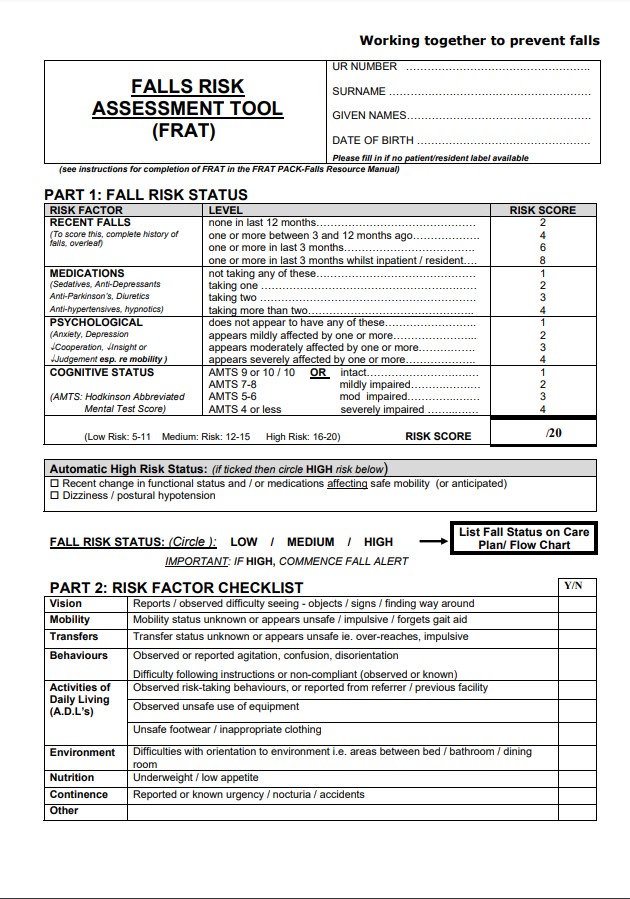The 4-Minute Rule for Dementia Fall Risk
The Of Dementia Fall Risk
Table of ContentsThe Best Guide To Dementia Fall RiskIndicators on Dementia Fall Risk You Need To KnowSome Known Questions About Dementia Fall Risk.The Main Principles Of Dementia Fall Risk 8 Simple Techniques For Dementia Fall Risk
You could be nervous because you have actually had a fall before or because you've seen you're starting to really feel unsteady on your feet. You might have seen changes to your health, or simply seem like you're reducing a little. Whatever the factor, it isn't unusual to come to be mindful and shed self-confidence, and this can quit you doing the points you made use of to do and make you feel a lot more separated.If you've had a fall or you've begun to really feel unsteady, inform your doctor also if you really feel fine otherwise. Your medical professional can inspect your equilibrium and the way you walk to see if renovations can be made. They may have the ability to refer you for a drops threat assessment or to the falls avoidance solution.
This info can be gotten through meetings with the person, their caregivers, and an evaluation of their medical documents. Begin by asking the private about their background of falls, consisting of the regularity and circumstances of any type of recent falls. Dementia Fall Risk. Inquire regarding any kind of movement problems they may experience, such as unsteady or difficulty strolling
Conduct a comprehensive review of the person's drugs, paying specific attention to those known to enhance the risk of falls, such as sedatives or drugs that reduced blood stress. Figure out if they are taking multiple medications or if there have actually been recent changes in their drug regimen. Assess the person's home setting for possible risks that might raise the danger of drops, such as inadequate illumination, loosened carpets, or lack of grab bars in the bathroom.
Dementia Fall Risk Can Be Fun For Everyone
Guide the individual through the loss threat assessment kind, discussing each question and taping their responses accurately. Guarantee that the individual recognizes the function of the evaluation and feels comfortable giving sincere responses. Compute the total threat rating based upon the reactions given in the assessment form. Establish the individual's risk category (low, medium, or high) based on the total rating and the visibility of automatic high-risk standing factors.
Consistently monitor the individual's progress and reassess their danger of falls as needed. Provide ongoing education and support to promote safety and security and reduce the threat of falls in their day-to-day living tasks.
Several researches have revealed that physical treatment can help to decrease the risk of dropping in grownups ages 65 and older. In a new research (that looked at falls threat in females ages 80 and older), scientists determined the financial effect of choosing physical therapy to avoid drops, and they found that doing so saves $2,144, including all the surprise costs of your time, discomfort, missed out on life events, and the dollars spent for services.
The 9-Second Trick For Dementia Fall Risk
Examining your heart price and high blood pressure dimensions at rest and while you turn (from sitting or lying to standing). A basic test of your thinking (cognitive) capabilities. Analyzing your balance, strength, and walking ability. A simple vision examination. Assessing your feet and shoes. A home safety analysis. Based upon the analysis results, your physiotherapist will certainly develop a plan that is tailored to your specific my blog requirements.
Older grownups who have trouble strolling and chatting at the exact same time go to a greater risk of dropping. Dementia Fall Risk. To aid boost your safety during day-to-day tasks, your physiotherapist may develop a training program that will challenge you to preserve standing and walking while you do an additional task. Examples include strolling or standing while counting in reverse, having a conversation, or carrying a bag of groceries
Your physiotherapist likewise can determine which activities you must prevent to remain risk-free. Community-based drops avoidance programs assist people to: Minimize their concern of dropping. Set goals for enhancing their physical activity. Make their homes much safer. Exercise much more to enhance their strength and balance. These programs typically are led by volunteer instructors.
Some Known Factual Statements About Dementia Fall Risk

Measles, or rubeola, is an extremely infectious, acute viral transmittable condition triggered by the measles virus. Some people think about measles as simply a rash and fever that gets rid of up in a couple of days; nevertheless, measles can cause significant health and wellness problems, especially in youngsters more youthful than 5-years-old. The most effective protection versus measles is the measles, mumps, and rubella (MMR) injection.
Falls are an usual reason for injury among older grownups. According to the CDC, in one year alone, fall-related injuries added to over $50 billion in medical prices (Dementia Fall Risk). In healthcare facility Go Here settings, older grownups go to particularly high threat of drops since their minimized movement from being confined to a space or bed.
Our Dementia Fall Risk Statements

She has no history of drops, her stride is constant, and she voids with no issues. The previous nurse states that she calls for support to the shower room when she requires to go.
Instances of typical autumn interventions/measures include: Guaranteeing a client's important items are within reach. Beyond recognizing just how to utilize the Johns Hopkins Loss Danger Assessment Tool, it's important that centers integrate its usage into a more comprehensive loss avoidance plan.